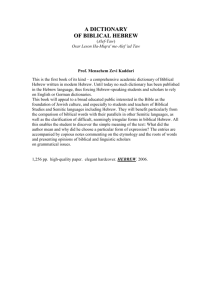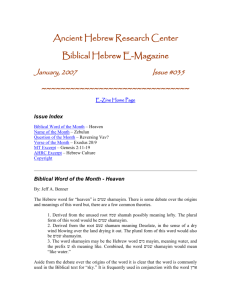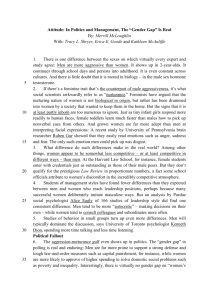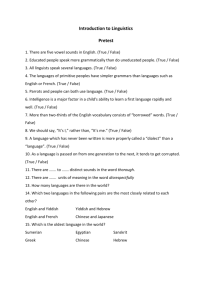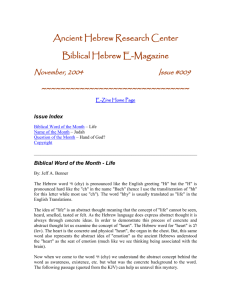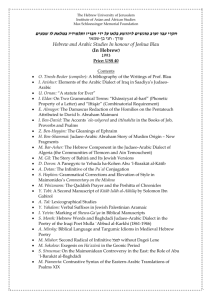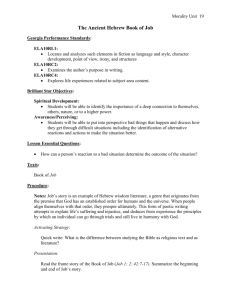Biblical Hebrew E-Magazine - Ancient Hebrew Research Center
advertisement
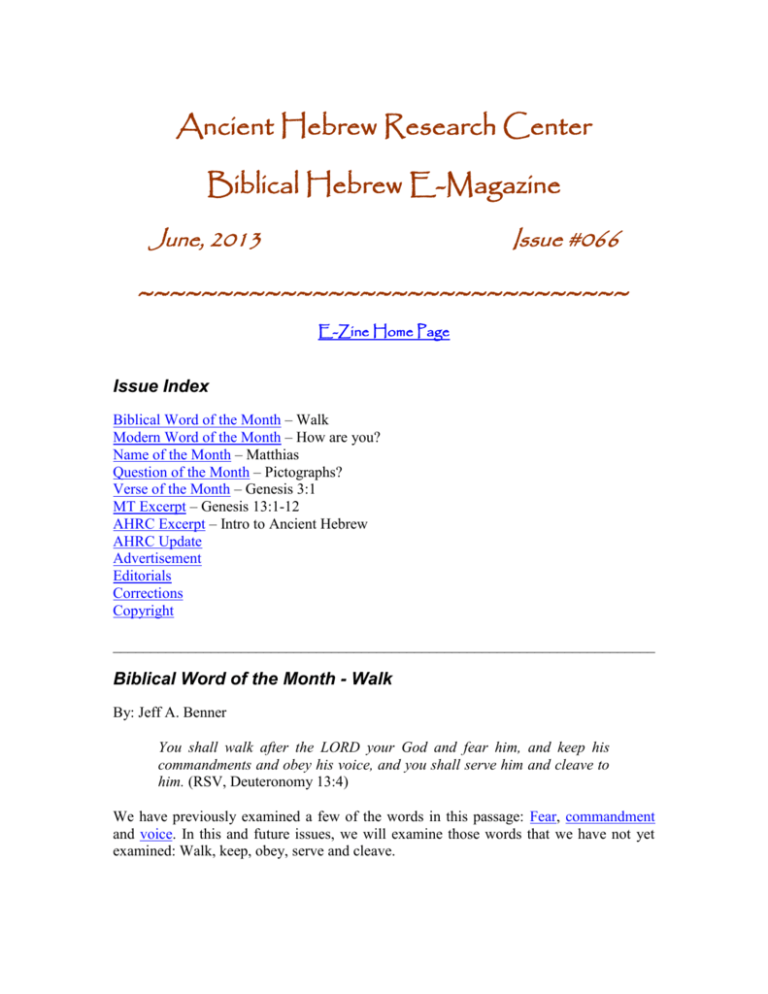
Ancient Hebrew Research Center Biblical Hebrew E-Magazine June, 2013 Issue #066 ~~~~~~~~~~~~~~~~~~~~~~~~~~~~~~~ E-Zine Home Page Issue Index Biblical Word of the Month – Walk Modern Word of the Month – How are you? Name of the Month – Matthias Question of the Month – Pictographs? Verse of the Month – Genesis 3:1 MT Excerpt – Genesis 13:1-12 AHRC Excerpt – Intro to Ancient Hebrew AHRC Update Advertisement Editorials Corrections Copyright ________________________________________________________________________ Biblical Word of the Month - Walk By: Jeff A. Benner You shall walk after the LORD your God and fear him, and keep his commandments and obey his voice, and you shall serve him and cleave to him. (RSV, Deuteronomy 13:4) We have previously examined a few of the words in this passage: Fear, commandment and voice. In this and future issues, we will examine those words that we have not yet examined: Walk, keep, obey, serve and cleave. Biblical Hebrew E-Magazine The Hebrew verb ( הלךH.L.K, Strong's #3212) literally means to "walk," as can be seen in the following passage. And Abner and his men walked all that night through the plain… (KJV, 2 Samuel 2:29) This word is also used frequently in a figurative sense as can be seen in the following passage. And if thou wilt walk in my ways, to keep my statutes and my commandments, as thy father David did walk, then I will lengthen thy days. (KJV, 1 Kings 3:14) In this passage, YHWH is asking Solomon to "walk" in the footsteps of his father David, who walked in the footsteps of YHWH. A son "walks" in the footsteps of his father, a student "walks" in the footsteps of his teacher and a people "walk" in the footsteps of their ancestors. In our English language, we call this "culture." Many of your thoughts and actions are a result of "walking" in the footsteps of your parents, family, neighbors and community. In the case of Israel, their culture was to patterned after YHWH's teachings, but the other nations culture was patterned after other gods. And you shall not walk in the customs of the nation which I am casting out before you; for they did all these things, and therefore I abhorred them. (RSV, Leviticus 20:23) The Hebrew language always uses concrete concepts to express abstract thought. While we may use an abstract word like "culture," the Hebrew language will use a much more concrete word, such as "walking," to express the same idea. Israel was commanded to walk in YHWH's footsteps (follow YHWH's customs) and not walk in the footsteps of other gods (follow the customs of other nations). ________________________________________________________________________ Modern Word of the Month – How are you? By: Jeff A. Benner When visiting other countries it is always appreciated if you attempt to communicate in the native language of the people you are visiting, even if they speak perfect English, and they will respect you for your attempt. Because of this, I thought that it might be useful to cover some very basic Hebrew vocabulary words and phrases that one would need when speaking to a native born Israeli. Hebrew is a number and gender specific language, so how you say "how are you?" will depend on if you are speaking to a man or a woman or to one person or a group. If you are speaking to a man, you would say ( מה שלמךmah sh'lom'kha). The word ( מהmah) 2 Biblical Hebrew E-Magazine means "what," and the word ( שלמךsh'lom'kha) is the word ( שלוםshalom) meaning "peace" (or more literally, wholeness and completeness), with the suffix ( ךkha) meaning "you" (masculine singular). Literally, the phrase mah sh'lom'kha means "what is your completeness?" If you are speaking to a woman, then this would be ( מה שלמךmah sh'lom'ekh), which includes the suffix ( ךekh) meaning "you" (feminine singular). If you are speaking to a group of men, then it would be ( מה שלמכםmah sh'lom'khem), which includes the suffix ( כםkhem) meaning "you" (masculine plural). If you are speaking to a group of women, then it would be ( מה שלמכןmah sh'lom'khen), which includes the suffix כן (khen) meaning "you" (feminine plural). If you are speaking to a group of men and women, then you would use ( מה שלמכםmah sh'lom'khem), the masculine plural form, as the masculine plural is always used for mixed genders. And they cast lots for them, and the lot fell on Matthias; and he was enrolled with the eleven apostles. (RSV, Acts 1:26) ________________________________________________________________________ Name of the Month - Matthias By: Jeff A. Benner And they cast lots for them, and the lot fell on Matthias; and he was enrolled with the eleven apostles. (RSV, Acts 1:26) To replace Judas, the disciples cast lots for the new apostle, and the lot fell on Matthias. In a previous issue, we examined the name "Matthew," which in the Greek is written as Mat-thai-os. The Greek for Matthias is very similar; Mat-thi-as. Both Matthaios and Matthias are Greek forms of the Hebrew name ( מתתיהmatityah), which we previously found to be ( מתתmatat, Strong's #4991) meaning “gift” or “reward,” and the name יה (Yah, Strong's #3050) and when combined, this name means “gift of Yah” or “reward of Yah.” _______________________________________________________________________ Question of the Month – Pictographs? By: Jeff A. Benner Q: Can the definition of a Hebrew word be determined by the pictures of the Hebrew letters? 3 Biblical Hebrew E-Magazine A: Based on my research, I am convinced that the original Hebrew letters were pictures, each with a specific meaning. It is also very apparent that when you combine these letters to form words, the pictures are related to the meaning of the words. However, because of the distance between our time and culture and theirs, it is very difficult to know exactly what these letters meant and even more so, their combinations. Therefore, the interpretations of these words, based on the letters alone, are very subjective. While I have found looking at the meanings of the letters in a word helpful (and even a lot of fun), I do not advocated getting a definition of a word based solely on the letters themselves, but instead by examining the definition of the word from Lexicons and the context of how it is used in the text. ________________________________________________________________________ Verse of the Month – Genesis 3:1 By: Jeff A. Benner וְ הַ נָּחָּ ׁש הָּ יָּה עָּ רּום ִמכֹּל חַ יַת ַה ָּשדֶ ה אֲ ֶׁשר עָּ שָּ ה יְ הוָּה ֹלהים ל ֹּא ת ֹּאכְ לּו ִ ֱי־א ַמר א ָּ ִֹלהים וַי ֹּאמֶ ר ֶאל־הָּ ִאשָּ ה ַאף כ ִ ֱא ִמכֹּל עֵ ץ הַ גָּן׃ Now the serpent was more subtle than any beast of the field which Jehovah God had made. And he said unto the woman, Yea, hath God said, Ye shall not eat of any tree of the garden? (ASV) ( וְ הַ נָּחָּ ׁשve-ha-na-hhash) This is the word ( נחשna-hhash) meaning "serpent," with the ( הh) prefix meaning "the" and the ( וv) prefix meaning "and." ( הָּ יָּהhai-yah) The verb ( היהH.Y.H) means to "exist." The written form of this verb identifies the verb tense as perfect - existed - and the subject of the verb as third person, masculine, singular - he existed. ( עָּ רּוםa-rum) This word is a noun meaning one who is crafty or sly. ( ִמכֹּלmee-kol) The base word is ( כלkol) meaning “all.” The prefix ( מmi) means “from.” Combined, this means “from all” or in the context of this passage, "more than all." 4 Biblical Hebrew E-Magazine ( חַ יַתhhai-yat) This is the feminine noun ( חיהhhai’yah), derived from the masculine noun ( חיhhai), both words meaning a "living one." This word is written in the construct state so the ( הah) is changed to ( תat). ( הַ שָּ דֶ הha-sa-deh) This is the noun ( שדהsadeh) meaning "field" with the prefix ( הha) meaning "the" – the field. ( אֲ ׁשֶ רa-sher) This is a common Hebrew word meaning "which" or "who". ( עָּ שָּ הa-sah) The verb ( עשהA.S.H) means “to do,” but often in the sense of "making." This form of the verb (no prefixes or suffixes) identifies the subject of the verb as third person, masculine, singular and the tense as perfect – "he did" or "he made." ( ְיהוָּהYHWH) This is the Tetragramaton, the four letter name of the God of the Hebrews, usually pronounced Yahweh. There are many theories as to the origin and meaning of this name but most likely comes from the verb ( הוהhawah) meaning to exist. The yud added to the beginning identifies the object of the verb as first person, masculine, singular, imperfect tense or "he exists". ֹלהים ִ ֱ( אe-lo-heem) The base word is ( אלוהe-lo-ah), which is commonly translated as "God" or "god," but more literally means "one of power and authority." The suffix ( יםiym) is the masculine plural so this word means “gods” or “ones of power and authority.” However, this plural noun is often used as a name for YHWH. Because this is being used as a name, it should be transliterated as “Elohiym” rather than translating it with the English word “God.” ( וַ י ֹּאמֶ רvai-yo-mer) The base word is the verb ( אמרa-mar) meaning to say or speak. The prefix ( יy) identifies the subject of the verb as third person, masculine, singular, imperfect tense (he will say). The prefix ( וv) means "and" and will also reverse the tense of the verb from imperfect to perfect (and he said). ( ֶאלel) This is a preposition meaning "to." ( הָּ ִאשָּ הha-ee-shah) The prefix הmeans "the". The word ( אשהee-shah) means "woman". 5 Biblical Hebrew E-Magazine ( ַאףaph) This word is a conjunction meaning "moreover," "in addition," or "furthermore." ( כִ יkee) This word is a preposition meaning "that." This and the previous word are combined to mean "really." ( ָּאמַ רa-mar) The verb ( אמרA.M.R) means to say or speak. This form of the verb (no prefixes or suffixes) identifies the subject of the verb as third person, masculine, singular and the tense as perfect – "he said." ֹלהים ִ ֱ( אe-lo-heem) The base word is ( אלוהe-lo-ah), which is commonly translated as "God" or "god," but more literally means "one of power and authority." The suffix ( יםiym) is the masculine plural so this word means “gods” or “ones of power and authority.” However, this plural noun is often used as a name for YHWH. Because this is being used as a name, it should be transliterated as “Elohiym” rather than translating it with the English word “God.” ( ל ֹּאlo) This is the Hebrew word meaning “no” or “not.” This word is often placed before a verb to place the action of that verb in the negative. ( ת ֹּאכְ לּוtok-lu) The base word is the verb ( אכלA.K.L) meaning to eat. The prefix ( תto) and the suffix ו (u) identify the subject of the verb as second person, masculine, plural, imperfect tenseyou will eat (Hebrew uses the masculine plural for a group of mixed genders). ( ִמכֹּלmee-kol) The base word is ( כלkol) meaning “all.” The prefix ( מmi) means “from.” Combined, this means “from all” or in the context of this passage, "more than all." ( עֵ ץeyts) This is a noun meaning "tree." ( הַ גָּןha-gan) The base word is the noun ( גןgan) meaning "garden," with the prefix ( הha) meaning "the." The following is a literal rendering of this verse from its Hebraic meaning. 6 Biblical Hebrew E-Magazine And the serpent was crafty, more than all the living ones of the field, which YHWH Elohiym made. And he said to the woman, "did Elohiym really say you will not eat from all the trees of the garden?" In following issues we will continue with this chapter. ________________________________________________________________________ Mechanical Translation Excerpt - Genesis 13:1-12 1&and “Avram [Father raised]” went up from “Mitsrayim [Troubles]”, he and his woman and all of the ones which belonged to him and “Loth [Covering]” with him unto the south country, 2&and “Avram [Father raised]” was much heavy in livestock, in silver and in gold, 3&and he walked to the breaking of his camps from the south country and as far as “Beyt-El [House of El]”, as far as the place where her tent existed, there in the first time between “Beyt-El [House of El]” and the “Ay [Heap of ruins]”, 4&to the place of the altar which he made there in the first and there “Avram [Father raised]” called out in the title of “YHWH [He exists]”, 5&and also to “Loth [Covering]”, the one walking with “Avram [Father raised]”, existed flocks and cattle and tents, 6&and the land did not lift them up to settle together given that their goods existed abundantly and they were not able to settle together, 7&and strife existed between the feeders of the livestock of “Avram [Father raised]” and the feeders of the livestock of “Loth [Covering]” and the one of “Kena'an [Lowered]” and the one of “Perez [Peasant]” were at that time settling in the land, 8&and “Avram [Father raised]” said to “Loth [Covering]”, please, let not contention exist between me and you and between my feeders and your feeders given that we are men of brothers, 9&is not all of the land to your face, please be divided apart from upon me, if the left hand, I will go right and if the right hand, I will go left, 10&and “Loth [Covering]” lifted up his eyes and he saw all of the roundness of the “Yarden [Descender]” given that all of her was drinking, before much damaging of “YHWH [He exists]” at “Sedom [Secret]” and at “Ghamorah [Rebellion]”, like the garden of “YHWH [He exists]” and like the land of “Mitsrayim [Troubles]” as you come to “Tso'ar [Tiny]”, 11&and “Loth [Covering]” chose for him all of the roundness of the “Yarden [Descender]” and “Loth [Covering]” lifted up from the east and they divided apart, each from upon his brother, 12& “Avram [Father raised]” had settled in the land of “Kena'an [Lowered]” and “Loth [Covering]” had settled in the cities of the roundness and he pitched the tent as far as “Sedom [Secret]”, For details on this new translation see the web site at http://www.mechanical-translation.org _______________________________________________________________________ 7 Biblical Hebrew E-Magazine AHRC Website Excerpt – Intro to AH When I first started learning Hebrew, I learned the Hebrew alphabet, the same Hebrew alphabet that can be seen any Hebrew Bible. A portion of a Modern Hebrew Bible However, while reading our local paper in 1997 I came across the article "Evidence of Solomon's temple found." In this article was a photograph of a 3,000 year old receipt for 3 shekel's for a donation to the "House of Yahweh" by "Ashyahu the King," written on a piece of pottery fragment. What I found most interesting was that this Hebrew inscription was written in an alphabet that was nothing like the Hebrew I had learned and this begun my journey into the Ancient Hebrew alphabet and language of the Bible. An Ancient Hebrew Inscription Contents: 8 Biblical Hebrew E-Magazine The relationship between the Hebrew words of the Bible and the Ancient Hebrew culture The differences between Greek and Hebrew concepts The meaning of the letters in the ancient pictographic Hebrew script The root system of the Ancient Hebrew language A Hebraic interpretation of the Aaronic Blessing [Read the Book] [Watch the Video] ________________________________________________________________________ Advertisements Learn to Read Biblical Hebrew - Part 2 by Jeff A. Benner (NEW) After learning the Hebrew alphabet, it's time to learn Hebrew grammar, morphology and syntax. This book provides the basics to Hebrew grammar, word construction and syntax, or sentence structure. In addition, it examines each Hebrew word in the Ten Commandments and breaks down the roots, prefixes and suffixes of each word. This book will be a valuable tool for anyone interested in learning how to read the Hebrew Bible in its original language. Additional information and ordering details are available through the bookstore. (http://www.ancient-hebrew.org/bookstore) ________________________________________________________________________ Editorials Do you have a comment or personal insight into the articles in this issue of the E-Zine? If so, let us know. From David L.: I have enjoyed your issues immensely. I do take exception to your definition of “adam” as simply human. The word human originally was a contraction of “hued man”. Adam is more correctly defined as “man who shows blood in the face”. This more correct definition is, of course, politically incorrect, but for Whom do instruct? Why change His Word as do those who have arrogantly removed His Name from the text over 6800 times? My Response: 9 Biblical Hebrew E-Magazine The objective of the Mechanical Translation is to use only one or two English words that best transmit the meaning of each Hebrew word. While “human” does not completely convey the meaning of the Hebrew “Adam,” it is the best possible match. The Mechanical Translation is also equipped with a dictionary that will more specifically define the word to its Hebrew meaning. Currently, the dictionary defines this word as “relating to, or characteristic of man. The first man. All of mankind as the descendants of the first man.” As this word is derived from the verb “adam,” meaning “to be reddish,” and is derived from the word “dam,” meaning “blood,” I am going to add to the dictionary for future publications of the Mechanical Translation, “Derived from a root meaning “blood” and “of reddish color.” _____________________________________________________________________ Corrections Did you find any errors needing correction in the articles in this issue of the E-Zine? If so, let us know. _____________________________________________________________________ Copyright © 2013 Jeff A. Benner Ancient Hebrew Research Center Please feel free to use, copy or distribute any material within the "Biblical Hebrew E-Magazine" for nonprofit educational purposes only. ________________________________________________________________________ 10

